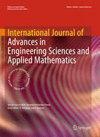Experimental study of RDF-5 performance based on natural waste on fast pyrolysis process on the quality of the liquid smoke
IF 0.8
Q3 ENGINEERING, MULTIDISCIPLINARY
International Journal of Advances in Engineering Sciences and Applied Mathematics
Pub Date : 2023-09-01
DOI:10.11591/ijaas.v12.i3.pp250-256
引用次数: 0
Abstract
Energy problems are one of the cases faced by almost all countries in the world. No longer found oil reserves in significant quantities causing problems in the energy sector. The world's energy needs continue to increase and become a global problem in the use of energy in various sectors resulting in an energy crisis. The use of waste-to-energy (WtE) technology is appropriate, considering that energy needs continue to increase along with the increasing amount of waste that is not managed and hurts the ecosystem. Refuse-derived fuel (RDF) is a waste management technique that converts waste into bio-solid fuel. RDF is produced from the mechanical separation of combustible and non-combustible fractions from waste. Utilizing RDF biomass from durian peel and sugar palm is one of the efforts to maximize the pyrolysis process in organic waste, increasing the combustion potential. Processing durian skin and sugar palm waste into RDF will maximize the potential of the combustion results, which can later facilitate testing. This study also aims to utilize sugar palm waste and durian peel to have a use value as an alternative fuel. This research was an experimental study, fast pyrolysis was employed by using 300 grams both in durian and sugar palm, and the temperature was varied from 400, 500, and 600 °C. The results showed that the test of liquid smoke RDF-5 sugar palm at a temperature of 400 °C at 112 mL and RDF-5 durian at 600 °C at 137 mL.基于自然废弃物的RDF-5性能快速热解工艺对液烟质量的影响实验研究
能源问题是世界上几乎所有国家都面临的问题之一。不再发现大量石油储备,导致能源部门出现问题。世界的能源需求不断增加,并成为一个全球性的问题,在各个部门的能源使用导致能源危机。考虑到能源需求不断增加,而不加以管理的废物数量不断增加,损害了生态系统,因此使用废物转化为能源(WtE)技术是适当的。垃圾衍生燃料(RDF)是一种将废物转化为生物固体燃料的废物管理技术。RDF是由从废物中机械分离可燃和不可燃馏分而产生的。利用榴莲皮和糖棕榈中的RDF生物质是最大限度地利用有机废物热解过程,增加燃烧潜力的努力之一。将榴莲皮和糖棕榈废料加工成RDF将最大限度地发挥燃烧结果的潜力,这可以为以后的测试提供方便。本研究还旨在利用糖棕榈废料和榴莲皮作为替代燃料,使其具有使用价值。本研究为实验研究,分别以300 g榴莲和300 g糖棕榈为原料,在400、500、600℃范围内进行快速热解。结果表明,试验液烟RDF-5糖棕榈在温度为400℃时为112 mL, RDF-5榴莲在温度为600℃时为137 mL。
本文章由计算机程序翻译,如有差异,请以英文原文为准。
求助全文
约1分钟内获得全文
求助全文
来源期刊

International Journal of Advances in Engineering Sciences and Applied Mathematics
ENGINEERING, MULTIDISCIPLINARY-
自引率
0.00%
发文量
6
期刊介绍:
International Journal of Advances in Engineering Sciences and Applied Mathematics will be a thematic journal, where each issue will be dedicated to a specific area of engineering and applied mathematics. The journal will accept original articles and will also publish review article that summarize the state of the art and provide a perspective on areas of current research interest.Articles that contain purely theoretical results are discouraged.
 求助内容:
求助内容: 应助结果提醒方式:
应助结果提醒方式:


